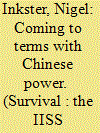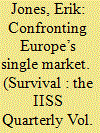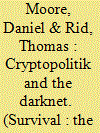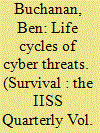|
|
|
Sort Order |
|
|
|
Items / Page
|
|
|
|
|
|
|
| Srl | Item |
| 1 |
ID:
143031


|
|
|
|
|
| Summary/Abstract |
If one story in 2015 epitomised the challenge faced by the Western world in coming to terms with a rising China, it was the state visit of President Xi Jinping to the United Kingdom from 20–23 October. Such visits are normally highly scripted and choreographed, involving more form than substance, and in many ways, this one was no exception. Much of the pageantry in which the UK excels was on display. And the perennial fascination of China’s Marxist–Leninist leadership with the British royal family was equally in evidence.
|
|
|
|
|
|
|
|
|
|
|
|
|
|
|
|
| 2 |
ID:
143023


|
|
|
|
|
| Summary/Abstract |
In launching a renegotiation of the terms of British membership, and thereby declaring the current settlement to be inadequate, Prime Minister David Cameron has contrived to make a confusing case for the United Kingdom remaining part of the European Union. His task is made more difficult by the fact that – like many other supporters of the EU – he is selling a vision of Europe that misrepresents both the EU’s weaknesses and its greatest strength.
|
|
|
|
|
|
|
|
|
|
|
|
|
|
|
|
| 3 |
ID:
143021


|
|
|
|
|
| Summary/Abstract |
Encryption policy is becoming a crucial test of the values of liberal democracy in the twenty-first century. The trigger is a dilemma: the power of ciphers protects citizens when they read, bank and shop online – and the power of ciphers protects foreign spies, terrorists and criminals when they pry, plot and steal. Encryption bears directly on today’s two top threats, militant extremism and computer-network breaches – yet it enables prosperity and privacy. Should the state limit and regulate the fast-growing use of cryptography? If so, how?
|
|
|
|
|
|
|
|
|
|
|
|
|
|
|
|
| 4 |
ID:
143027


|
|
|
|
|
| Summary/Abstract |
It has become commonplace to describe the Islamic State, also known as ISIS, as a cult. Saudi Arabian Foreign Minister Adel al-Jubeir, former Australian prime minister Tony Abbott, US President Barack Obama and Secretary of State John Kerry have all used the term, in an apparent attempt to discredit the organisation and strip it of its claim to Islamic credentials. But beyond the label lies a strategic implication: if ISIS is indeed a cult, it cannot be fought as a mere terrorist organisation or a proto-state with territorial ambitions. Cults do not recruit and indoctrinate like other political entities; they do not perform like mere militias on the battlefield; and they follow their own warped logic. Cults are more flexible, more cohesive, more agile and ultimately more challenging than other enemies. Most worryingly, leaving a cult is a difficult endeavour, which means that ISIS returnees are very likely to remain attached to the organisation, regardless of their experience with it. Security services will have to bear ISIS’s cultish characteristics in mind as they work to reduce the threat from the Islamic State.
|
|
|
|
|
|
|
|
|
|
|
|
|
|
|
|
| 5 |
ID:
143030


|
|
|
|
|
| Summary/Abstract |
Looking back today, it is difficult to assess the state of the Middle East in summer 2014, before fighters from the Islamic State (also known as ISIS or ISIL) poured across the thinly guarded Iraqi–Syrian border and quickly seized a huge chunk of Iraq. To a certain extent, the chaos that had gripped the region since the onset of the Arab Spring in 2011 was beginning to settle. Syria’s civil war continued to rage, but Egypt’s experiment with Islamist rule had run its course, and the United States and its P5 partners were on the way to a breakthrough in nuclear diplomacy with Iran. But the ISIS blitzkrieg into Iraq signalled the emergence of a new force in the Middle East – a hybrid organisation that combined terrorist tactics, military precision, religious ideology, and technological and bureaucratic innovation.
|
|
|
|
|
|
|
|
|
|
|
|
|
|
|
|
| 6 |
ID:
143022


|
|
|
|
|
| Summary/Abstract |
Technology isn’t human, but it has stages of life. The period after the conception of a new piece of technology is often marked by significant investments of time and resources, often with little tangible return. If this work is successful, the technology begins to enter use, benefiting from iteration and design improvements. It may then begin to spread, gaining in popularity and begetting virtuous economies of scale. If all continues to progress, the technology will mature in the marketplace. Even if it attains market dominance, however, that position will not be permanent. In time, an upstart technology will appear on the scene, and the process will begin again. Sometimes the old technology will stick around in one form or another, carving out a niche role for itself. More frequently, it will be cast aside and supplanted.
|
|
|
|
|
|
|
|
|
|
|
|
|
|
|
|
| 7 |
ID:
143028


|
|
|
|
|
| Summary/Abstract |
On 23 November 2015, the United Kingdom unveiled its latest Strategic Defence and Security Review (SDSR), in conjunction with its new National Security Strategy.1 The SDSR was generally well received; this seemed to be a broadly coherent strategic document, in contrast to its predecessor in 2010,2 which had been driven by the imperatives of an austerity agenda, and which significantly reduced UK military capabilities. Against a more benign budgetary backdrop, the 2015 SDSR went some way towards reconstituting some of the reductions made in 2010.
|
|
|
|
|
|
|
|
|
|
|
|
|
|
|
|
| 8 |
ID:
143024


|
|
|
|
|
| Summary/Abstract |
In the February–March 2016 issue of Survival, Thomas Rid and Daniel Moore explore the ‘darknet’; Ben Buchanan sketches the life cycles of cyber threats; Erik Jones considers the problem of Europe’s single market; Nadezhda Arbatova and Alexander Dynkin survey world order after Ukraine; Alexander Lukin considers Russia’s place in a post-bipolar world; Florence Gaub argues that ISIS is best thought of as a cult; Nick Childs measures British naval ambition; William Potter recaps the 2015 NPT Review Conference; Ben Fishman contributes a review essay on ISIS; Bruno Tertrais, Angela Stent and Lanxin Xiang review recent books; and Nigel Inkster argues for the West to come to terms with Chinese power.
|
|
|
|
|
|
|
|
|
|
|
|
|
|
|
|
| 9 |
ID:
143026


|
|
|
|
|
| Summary/Abstract |
Near the turn of the twenty-first century, one of the two poles of the system that had prevailed since the end of the Second World War destroyed itself. The Soviet communist project had become uncompetitive, leading to its failure. Soviet ideology had cornered itself. Derived from the Western Enlightenment tradition, its ideas of technological progress and the satisfaction of people’s physical needs were not new. But Soviet ideology vowed that faster progress would be achieved not by enhancing self-rule and respect for individual rights and private property, but by concentrating resources in the hands of the state, nationalising property and ensuring its fair distribution. This project proved economically unviable. In addition, the Soviet Union set for itself the ideological goal of spreading its system to as many countries as possible and, eventually, to the whole world. This ambition wasted considerable resources and exacerbated economic problems.
|
|
|
|
|
|
|
|
|
|
|
|
|
|
|
|
| 10 |
ID:
143029


|
|
|
|
|
| Summary/Abstract |
The ninth review conference of the Treaty on the Non-Proliferation of Nuclear Weapons (NPT) was held in New York on 27 April–22 May 2015 under the presidency of Ambassador Taous Feroukhi of Algeria. Like its predecessors in 1980, 1990 and 2005, it failed to reach a consensus final document.
|
|
|
|
|
|
|
|
|
|
|
|
|
|
|
|
| 11 |
ID:
143025


|
|
|
|
|
| Summary/Abstract |
The crisis in Ukraine, and over Ukraine, has strained Russia’s relations with the West to breaking point. For the first time in 25 years, there is a threat of a new dividing line being drawn in Europe, which, since the end of the East–West confrontation, has been considered the world’s most stable region. The current crisis stems from the tension of a polycentric world order in which the hierarchy of power is changing very quickly.1 The countries of the European Union, experiencing a prolonged recession coupled with a crisis of integration, and the United States, still faced with the painful experience of lost wars in Afghanistan and Iraq, have neglected to take into account the new Russia’s mindset and integrationist interests. Fifteen years ago, during the Yugoslavian crisis, Russia was experiencing a sharp transformation – and even a sovereign default – and did not have the resources to defend its interests. By 2014, the situation had changed. This important development was disregarded by the West in providing unconditional support for the change of regime in Kiev, resulting in unexpected consequences. Looking back, one cannot help but conclude that both Russia and the West bear responsibility for the mistakes and miscalculations that have resulted in their most serious crisis in relations.
|
|
|
|
|
|
|
|
|
|
|
|
|
|
|
|
|
|
|
|
|